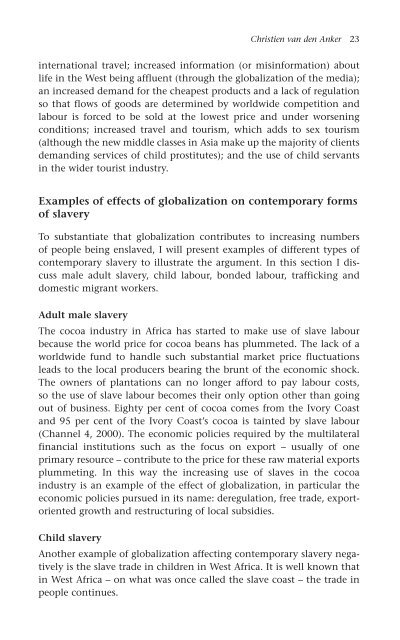3071-The political economy of new slavery
3071-The political economy of new slavery
3071-The political economy of new slavery
Create successful ePaper yourself
Turn your PDF publications into a flip-book with our unique Google optimized e-Paper software.
Christien van den Anker 23<br />
international travel; increased information (or misinformation) about<br />
life in the West being affluent (through the globalization <strong>of</strong> the media);<br />
an increased demand for the cheapest products and a lack <strong>of</strong> regulation<br />
so that flows <strong>of</strong> goods are determined by worldwide competition and<br />
labour is forced to be sold at the lowest price and under worsening<br />
conditions; increased travel and tourism, which adds to sex tourism<br />
(although the <strong>new</strong> middle classes in Asia make up the majority <strong>of</strong> clients<br />
demanding services <strong>of</strong> child prostitutes); and the use <strong>of</strong> child servants<br />
in the wider tourist industry.<br />
Examples <strong>of</strong> effects <strong>of</strong> globalization on contemporary forms<br />
<strong>of</strong> <strong>slavery</strong><br />
To substantiate that globalization contributes to increasing numbers<br />
<strong>of</strong> people being enslaved, I will present examples <strong>of</strong> different types <strong>of</strong><br />
contemporary <strong>slavery</strong> to illustrate the argument. In this section I discuss<br />
male adult <strong>slavery</strong>, child labour, bonded labour, trafficking and<br />
domestic migrant workers.<br />
Adult male <strong>slavery</strong><br />
<strong>The</strong> cocoa industry in Africa has started to make use <strong>of</strong> slave labour<br />
because the world price for cocoa beans has plummeted. <strong>The</strong> lack <strong>of</strong> a<br />
worldwide fund to handle such substantial market price fluctuations<br />
leads to the local producers bearing the brunt <strong>of</strong> the economic shock.<br />
<strong>The</strong> owners <strong>of</strong> plantations can no longer afford to pay labour costs,<br />
so the use <strong>of</strong> slave labour becomes their only option other than going<br />
out <strong>of</strong> business. Eighty per cent <strong>of</strong> cocoa comes from the Ivory Coast<br />
and 95 per cent <strong>of</strong> the Ivory Coast’s cocoa is tainted by slave labour<br />
(Channel 4, 2000). <strong>The</strong> economic policies required by the multilateral<br />
financial institutions such as the focus on export – usually <strong>of</strong> one<br />
primary resource – contribute to the price for these raw material exports<br />
plummeting. In this way the increasing use <strong>of</strong> slaves in the cocoa<br />
industry is an example <strong>of</strong> the effect <strong>of</strong> globalization, in particular the<br />
economic policies pursued in its name: deregulation, free trade, exportoriented<br />
growth and restructuring <strong>of</strong> local subsidies.<br />
Child <strong>slavery</strong><br />
Another example <strong>of</strong> globalization affecting contemporary <strong>slavery</strong> negatively<br />
is the slave trade in children in West Africa. It is well known that<br />
in West Africa – on what was once called the slave coast – the trade in<br />
people continues.


